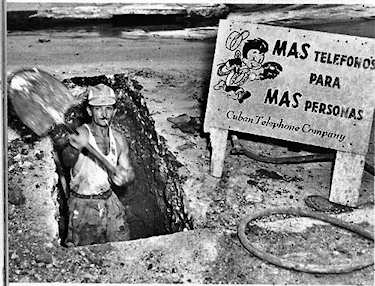
Recent rule changes adopted in April and designed to remove certain sanctions imposed on telecommunications to Cuba had been met with complete silence by the Cuban government. Until last weekend, that is.
According to a story in GlobalPost.com, the director of international operations for the Cuban telephone monopoly, rebuffed the White House’s overtures with a “thanks, but no thanks.” Well, more accurately, leave out the “thanks.” The response was pretty much limited to “no.”
[D]uring an official government newscast Saturday, ETECSA international operations director Vivian Iglesias said there were two major obstacles to such a partnership: some $160 million in frozen funds that the U.S. government seized from ETECSA in 2000, and trade restrictions imposed by the 1992 Cuban Democracy Act, which forces Cuba to pay U.S. companies through third countries, incurring additional transaction fees.
“It may seem like the Obama administration has expanded communication possibilities,†said Iglesias. “But we know that unless restrictions like the (Cuban Democracy Act) and others that have been tightened since 1992 don’t change, there can’t be any normal communication.â€
This appears to represent significant backtracking by Cuba on how to deal with the blocked funds. The blocked funds, which date back to 1966, represent funds owed by U.S. telecom carriers to Cuba for local carriage of calls originating in the United States. After the U.S. permitted payment of these local carriage charges to Cuba on a going-forward, but not retroactive, basis, Cuba attempted to recover the blocked funds with a 10 percent tax on calls to Cuba from the United States, even when routed through a foreign telecom company. Until the April regulations, U.S. authorities had refused to permit payment of this 10 percent tax, which ultimately led to Cuba’s suspension of direct telephone service between the United States and Cuba.
Now instead of seeking to recoup the funds incrementally through the tax, Cuba appears to want the U.S. to unblock the funds immediately. The problem here is that some of the blocked funds were released to pay judgments against the Cuban government obtained by the U.S. survivors of a Cessna flown by an American anti-Castro group into Cuban airspace and shot down by Cuba in 1996. Now that payment of the recoupment tax is permitted, the only reason that Cuba has moved the goal posts would appear to be that it’s not particularly interested in permitting direct calls from the U.S. to Cuba in any event.
 Permalink
Permalink
Copyright © 2009 Clif Burns. All Rights Reserved.
(No republication, syndication or use permitted without my consent.)

 Posted by
Posted by  Category:
Category: 

